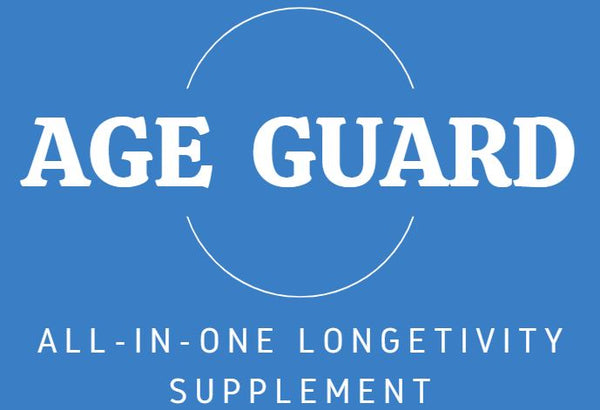
Role of Diet and Longevity: Complete Guide
Share
Could what you eat today really shape the years ahead? Evidence shows that midlife dietary changes can increase your odds of healthy aging by up to 86 percent. Food choices are more than just fuel. They program how your cells repair, protect, and regenerate over time. With every meal, you hold real influence over how your body ages, and the latest research reveals the powerful link between diet and long-term vitality.
Key Takeaways
| Point | Details |
|---|---|
| Diet as a Longevity Strategy | Nutritional choices can significantly influence health and aging, impacting cellular processes directly and promoting healthy longevity. |
| Impact of Specific Dietary Patterns | Diets rich in whole grains, fruits, vegetables, nuts, and healthy fats provide protective effects against aging and improve overall health. |
| Scientific Foundations of Nutritional Strategies | Approaches like caloric restriction, intermittent fasting, and the Mediterranean diet can modulate biological pathways that affect aging. |
| Risks of Poor Nutrition | Low intake of key nutrients can accelerate brain aging and cognitive decline; improving diet quality can lead to substantial long-term health benefits. |
Table of Contents
- Defining The Role Of Diet In Longevity
- Scientific Foundations Of Diet And Aging
- Key Dietary Patterns That Promote Longevity
- Impact Of Specific Nutrients On Aging Processes
- Risks Of Poor Nutrition And Common Pitfalls
Defining the Role of Diet in Longevity
Diet isn’t just about filling your stomach—it’s a powerful longevity strategy that can dramatically shape your health trajectory. Nutritional choices act like molecular instructions, communicating directly with your body’s cellular machinery and influencing how quickly or slowly you age.
According to a groundbreaking study published in Nature Medicine, following healthy dietary patterns during midlife can increase the likelihood of healthy aging by an astounding 45% to 86%. Learn more about diet optimization for comprehensive insights into strategic nutrition. The research highlights that diets rich in specific food groups can transform aging from an inevitable decline into a manageable, potentially controllable process.
The evidence is compelling. A comprehensive 30-year observational study tracking over 100,000 middle-aged adults revealed critical insights into diet’s longevity potential. Key dietary patterns emphasizing plant-based foods demonstrated significant protective effects:
- Whole grains
- Fresh fruits and vegetables
- Nuts and legumes
- Unsaturated healthy fats
These nutritional components aren’t just food—they’re cellular protection mechanisms. They work synergistically to reduce inflammation, support metabolic health, and potentially slow down the biological aging process.
 By making intentional dietary choices, you’re essentially programming your body’s long-term resilience and performance.
By making intentional dietary choices, you’re essentially programming your body’s long-term resilience and performance.
Scientific Foundations of Diet and Aging
At the core of longevity science lies a fascinating exploration of how dietary interventions can fundamentally reshape our aging process. The human body is not a static system, but a dynamic network where nutritional choices act as powerful molecular signals that can dramatically influence cellular health and aging trajectories.
A groundbreaking 2024 scoping review in Nutrients reveals remarkable insights into the molecular mechanisms driving dietary interventions. Explore micronutrient strategies that can optimize your cellular aging process. The research highlights four key dietary approaches that promote healthy aging by modulating critical biological pathways:
- Caloric Restriction: Reduces metabolic stress
- Intermittent Fasting: Triggers cellular repair mechanisms
- Mediterranean Diet: Supports systemic inflammation reduction
- Ketogenic Diet: Enhances metabolic flexibility
These dietary strategies work by intricately regulating key cellular pathways such as mTORC1, AMPK, and insulin signaling—essentially acting as molecular switches that can potentially slow down or even reverse certain aging processes. Recent research emphasizes that nutrition is not just about preventing disease, but actively supporting healthspan—the period of life spent in good health. By understanding these scientific foundations, we can transform diet from a mere survival mechanism into a sophisticated tool for long-term cellular wellness and resilience.
Here’s a comparison of key dietary patterns and their primary longevity benefits:
| Dietary Pattern | Main Features | Longevity Benefits |
|---|---|---|
| Caloric Restriction | Reduced calorie intake Balanced nutrients |
Lowers metabolic stress |
| Intermittent Fasting | Eating windows 12-16 hours fasting |
Triggers cellular repair |
| Mediterranean Diet | Plant-based foods Olive oil Fish |
Reduces inflammation, supports heart health |
| Ketogenic Diet | Low carb High healthy fats |
Enhances metabolic flexibility |
Key Dietary Patterns That Promote Longevity
Understanding the longevity diet isn’t about restrictive eating—it’s about strategic nutrition that supports your body’s cellular health and aging process. Modern research reveals that specific dietary patterns can significantly influence how we age, transforming nutrition from simple sustenance to a powerful health optimization tool.
Researchers have meticulously crafted a comprehensive longevity dietary approach based on extensive human and animal studies. Discover essential longevity diet tips to guide your nutritional strategy. This scientifically-backed approach emphasizes several key principles:
- Time-Restricted Eating: Consuming meals within 11-12 hour windows
- Protein Composition: Low plant-based protein intake
- Fat Sources: Approximately 30% energy from plant fats
- Food Selection: Prioritizing nutrient-dense whole foods
The ideal longevity diet comprises a carefully curated selection of foods that work synergistically to support cellular health. Key components include:
- Legumes
- Whole grains
- Vegetables
- Minimal meat consumption
- Occasional fish
- Nuts
- Olive oil
- Dark chocolate
A compelling cohort study of Chinese older adults further validates these dietary principles, demonstrating that plant-rich dietary patterns consistently correlate with lower all-cause mortality across both male and female populations. By embracing these nutritional strategies, you’re not just eating—you’re actively programming your body’s long-term health and resilience.
Impact of Specific Nutrients on Aging Processes
Nutrients are far more than simple fuel—they’re sophisticated molecular signals that can profoundly influence how we age. Cellular aging is a complex process where specific nutrients play crucial roles in modulating biological mechanisms that either accelerate or decelerate our body’s natural deterioration.
A comprehensive analysis of national health data provides fascinating insights into how nutrition directly impacts aging trajectories. Learn about anti-aging nutrients to optimize your nutritional strategy. The research identified 16 key nutrients associated with slowing down aging processes:
Vitamin and Mineral Powerhouses:
- Vitamin E: Potent antioxidant protection
- Vitamin A: Supports cellular regeneration
- B-Complex Vitamins: Energy metabolism and neurological health
- Vitamin K: Supports bone and cardiovascular health
Key Minerals and Nutrients:
- Magnesium
- Iron
- Zinc
- Copper
- Potassium
- Phosphorus
- Dietary fiber
Interestingly, the study even noted that moderate alcohol consumption might contribute to this anti-aging nutrient profile. This underscores a critical point: nutrition isn’t about extreme restrictions, but about strategic, balanced intake that supports cellular resilience and longevity. By understanding how specific nutrients interact with our body’s aging mechanisms, we can craft a targeted approach to nutritional wellness that goes beyond basic sustenance.
Risks of Poor Nutrition and Common Pitfalls
Nutrition isn’t just about what you eat—it’s about protecting your future self from potential health deterioration. Dietary choices can either be your most powerful wellness strategy or your silent health saboteur, with long-term consequences that extend far beyond immediate satisfaction.
Research reveals six critical nutrient deficiencies that can dramatically accelerate brain aging and cognitive decline. Explore comprehensive meal planning strategies to avoid these nutritional pitfalls. The most concerning deficiencies include:
Brain-Aging Nutrient Deficiencies:
- Vitamin B12: Essential for neurological function
- Omega-3 Fatty Acids: Critical for neural health
- Magnesium: Supports cognitive processing
- Vitamin D: Influences brain protection mechanisms
- Vitamin E: Provides antioxidant neural defense
- Anthocyanins: Supports cognitive resilience
A long-term study warns that poor dietary habits—particularly high consumption of ultra-processed foods and minimal plant-based nutrition—significantly reduce the likelihood of healthy aging. The research emphasizes a crucial insight: even small, incremental improvements in diet quality can create substantial long-term health benefits. By understanding these nutritional risks and proactively addressing potential deficiencies, you’re not just eating—you’re strategically investing in your future health and cognitive longevity.

Transform Your Longevity Strategy with Research-Backed Solutions
Struggling to translate dietary advice into real, lasting results for healthy aging? While this guide shows how critical nutrition is for cellular health and long-term vitality, building and maintaining the ideal regimen can feel overwhelming. Nutrient gaps, busy lifestyles, and changing needs can leave you searching for trustworthy, science-driven support that actually makes a difference.
Discover a proven way to bridge these gaps. 
Experience the benefits of the Age Guard Anti-Aging Supplement, expertly formulated with clinically supported ingredients like NMN, collagen, spermidine, and potent antioxidants. These compounds directly target cellular pathways linked to optimal aging and resilient health, as described throughout this article. Take action today, explore real customer results and quality guarantees at myageguard.com, and start your journey toward healthier aging. Your future self will thank you for prioritizing evidence-based solutions—visit our Anti-Aging Supplement collection now and see what difference dedicated nutrition can make.
Frequently Asked Questions
What dietary patterns are best for promoting longevity?
Diets rich in whole grains, fresh fruits and vegetables, nuts, legumes, and healthy fats like olive oil are associated with significant longevity benefits. Key dietary patterns include the Mediterranean diet, caloric restriction, and intermittent fasting.
How does nutrition affect the aging process?
Nutrition acts as a powerful molecular signal that influences cellular health and aging trajectories. Specific nutrients and dietary patterns can either accelerate or decelerate aging by modulating biological pathways related to metabolism and inflammation.
What are some key nutrients that can help slow down aging?
Important nutrients that support cellular aging include Vitamin E, Vitamin A, B-Complex vitamins, and key minerals such as magnesium, iron, and zinc. These nutrients play critical roles in maintaining health and reducing age-related decline.
What nutritional deficiencies should I be aware of to prevent cognitive decline?
Common nutrient deficiencies that can accelerate cognitive decline include Vitamin B12, Omega-3 fatty acids, magnesium, Vitamin D, Vitamin E, and anthocyanins. Addressing these deficiencies is crucial for maintaining cognitive health as you age.
